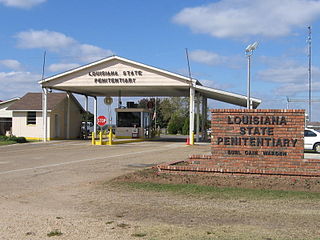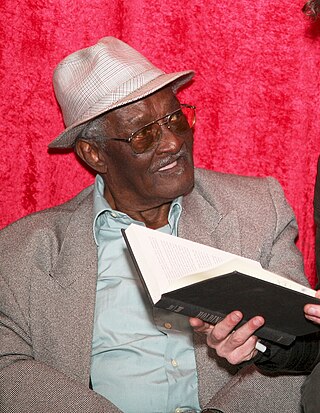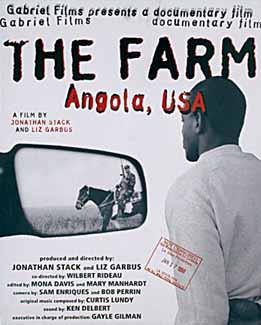A parole board is a panel of people who decide whether an offender should be released from prison on parole after serving at least a minimum portion of their sentence as prescribed by the sentencing judge. Parole boards are used in many jurisdictions, including the United Kingdom, the United States, and New Zealand. A related concept is the board of pardons and paroles, which may deal with pardons and commutations as well as paroles.

California State Prison, Corcoran (COR) is a male-only state prison located in the city of Corcoran, in Kings County, California. It is also known as Corcoran State Prison, CSP-C, CSP-COR, CSP-Corcoran, and Corcoran I. The facility is just north of the newer California Substance Abuse Treatment Facility and State Prison, Corcoran.

Wilbert Rideau is an American convicted killer and former death row inmate from Lake Charles, Louisiana, who became an author and award-winning journalist while held for 44 years at Angola Prison. Rideau was convicted in 1961 of first-degree murder of Julia Ferguson in the course of a bank robbery that year, and sentenced to death. He was held in solitary confinement on death row, pending execution. After the Supreme Court of the United States ruled that states had to rework their death penalty statutes because of constitutional concerns, the Louisiana Court judicially amended his sentence in 1972 to life in prison.

The Louisiana State Penitentiary is a maximum-security prison farm in Louisiana operated by the Louisiana Department of Public Safety & Corrections. It is named "Angola" after the former slave plantation that occupied this territory. The plantation was named after the country of Angola, from which many slaves originated before arriving in Louisiana.

The United States Penitentiary, Coleman I and II are high-security United States federal prisons for male inmates in Florida. It is part of the Coleman Federal Correctional Complex and is operated by the Federal Bureau of Prisons, a division of the United States Department of Justice. USP Coleman I was opened in 2001, and in 2004 Clark Construction completed a 555,000-square-foot (51,600 m2) additional component for USP Coleman II.
Troy Michael Kell is an inmate on death row in Utah. Kell was sentenced to life in prison by the State of Nevada for the 1986 murder of James "Cotton" Kelly. He was transferred to the Utah State Prison as part of a prisoner exchange program shortly after his conviction and on July 6, 1994, Kell attacked and killed inmate Lonnie Blackmon at the Utah Department of Corrections Gunnison facility. Kell stabbed Blackmon a total of 67 times while his associate, Eric Daniels, held Blackmon down. Kell was sentenced to death by firing squad for the murder.

Moreese Bickham was an American resident of Mandeville, Louisiana who was arrested, convicted, and sentenced to death for the July 12, 1958 killing of a sheriff's deputy, reportedly a local Klan leader. In 1974, Bickham's death sentence was converted to life without parole after the U.S. Supreme Court's decision in Furman v. Georgia, which invalidated death penalty convictions in certain circumstances. In April, 1995, through a detailed legal challenge to Bickham's 1958 conviction, the Governor of Louisiana consented to commute Bickham's sentence to 75 years. Several months later, Bickham's attorney won a full release, and Bickham left Angola State Penitentiary in January, 1996, after 37 1/2 years in prison. Bickham lived the rest of his life in California, and in April 2016, died in hospice care in Alameda, California after a short illness, at the age of 98.

John P. Whitley is a former Louisiana corrections officer who served as the warden of Louisiana State Penitentiary, the largest maximum-security in the United States, from 1990 to 1995. Time magazine credited Warden Whitley with turning around hopelessness and violence at Angola with "little more than his sense of decency and fairness."
Capital punishment was abolished in Colorado in 2020. It was legal from 1974 until 2020 prior to it being abolished in all future cases.

The Department of Public Safety and Corrections (DPS&C) is a state law enforcement agency responsible for the incarceration of inmates and management of facilities at state prisons within the state of Louisiana. The agency is headquartered in Baton Rouge. The agency comprises two major areas: Public Safety Services and Corrections Services. The secretary, who is appointed by the governor of Louisiana, serves as the department's chief executive officer. The Corrections Services deputy secretary, undersecretary, and assistant secretaries for the Office of Adult Services and the Office of Youth Development report directly to the secretary. Headquarters administration consists of centralized divisions that support the management and operations of the adult and juvenile institutions, adult and juvenile probation and parole district offices, and all other services provided by the department.

The Farm: Angola, USA is a 1998 award-winning documentary set in the notorious and largest American maximum-security prison, Louisiana State Penitentiary, known as Angola. Loosely based on articles published in Life Sentences, drawn from the prison magazine, The Angolite, the film was directed and produced by Jonathan Stack and Liz Garbus. Wilbert Rideau, a life prisoner who had been editor of the magazine since 1975, also participated in direction and was credited on the film.

The United States Penitentiary, Pollock is a high-security United States federal prison for male inmates in unincorporated Grant Parish, Louisiana. It is part of the Pollock Federal Correctional Complex and operated by the Federal Bureau of Prisons, a division of the United States Department of Justice. The facility also has an adjacent satellite prison camp for minimum-security male offenders.

The Alabama Department of Corrections (ADOC) is the agency responsible for incarceration of convicted felons in the state of Alabama in the United States. It is headquartered in the Alabama Criminal Justice Center in Montgomery.
David Wade Correctional Center (DWCC) is a Louisiana Department of Public Safety and Corrections prison located in an unincorporated area of Claiborne Parish, between Homer and Haynesville, Louisiana. The prison is located near the Louisiana-Arkansas border.

The Angolite is the inmate-edited and published prison magazine of the Louisiana State Penitentiary (Angola) in West Feliciana Parish, Louisiana.
C. Paul Phelps Correctional Center (PCC) was a Louisiana Department of Public Safety & Corrections prison for men, located in unincorporated Beauregard Parish, Louisiana, about 3 miles (4.8 km) north of DeQuincy and 30 miles (48 km) northwest of Lake Charles. The center was located on Louisiana Highway 27. It had a capacity of 942 prisoners and was a medium security facility.

The Red Hat Cell Block is a former prison housing unit of the Louisiana State Penitentiary in West Feliciana Parish, Louisiana which, for a time, also contained the state's execution chamber and electric chair.
Montgomery v. Louisiana, 577 U.S. 190 (2016), was a United States Supreme Court case in which the Court held that its previous ruling in Miller v. Alabama (2012), that a mandatory life sentence without parole should not apply to persons convicted of murder committed as juveniles, should be applied retroactively. This decision potentially affects up to 2,300 cases nationwide.
Prison newspapers are newspapers created within a prison, typically by the inmates.











